Gasoline generator for a gas boiler: specifics of choice and connection features
It is very important for residents of the private sector to take care of high-quality and uninterrupted heating of their home.A gas boiler, which requires an uninterrupted power supply, copes well with this function. Unfortunately, problems with electricity in the private sector are not uncommon. Do you agree?
By purchasing a gas generator for a gas boiler, you will ensure stable operation of the equipment during a power outage. Precious warmth will be preserved under any circumstances.
We will tell you what to look for when choosing a device, how to connect it to the equipment, and what problems you may encounter during operation.
The content of the article:
- How does a gas generator for a gas boiler work?
- Classification of gasoline generators
- Advantages of a gasoline generator
- Features of connecting the generator
- What to do if the boiler does not work from the generator
- What problems may occur after connecting?
- How to choose a gas generator?
- Conclusions and useful video on the topic
How does a gas generator for a gas boiler work?
In the event of a power failure, the boiler automation switches off the burner. The gas valve is designed in such a way that it is pressed due to the current passing through the coil. If there is no current, the valve closes.
In our country, power outages are not uncommon, so even if there is gas in the mains, owners of gas boilers have to sit in a cold house. A gas generator that transforms thermal energy into electricity will help solve the problem.
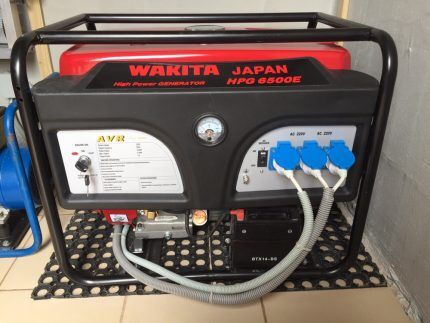
The equipment runs on liquid fuel (gasoline).The generator supports the uninterrupted operation of electrical appliances, in particular the electronics of a gas boiler. Its power is enough to provide electricity to a small one-story house.
The unit can be equipped with an automatic start system. Since household a gas boiler consumes a small amount of electricity, there is no need to purchase a powerful generator.
Such equipment is small in size and weighs up to 50 kg. Depending on the design, in emergency situations the device can generate energy for up to 4-8 hours.
Classification of gasoline generators
The gas generator can operate according to a synchronous or asynchronous scheme. In a synchronous type generator, the rotation of the starter's magnetic field is identical to the rotor.
Such a unit responds faster to power surges and provides smooth power thanks to the inductive coils on the rotor (fluctuations do not exceed 5%). Such generators are more expensive. The equipment is sensitive to moisture.
The rotor of an asynchronous generator is hidden in a sealed housing. Unlike a synchronous device, it is more protected from adverse natural factors. The rotation of the rotor and starter in asynchronous installations does not coincide.
The rotor is ahead of the starter. When the load changes, the voltage sags, which is unacceptable in the operation of a gas boiler. The equipment is not recommended for use to power high-precision instruments.
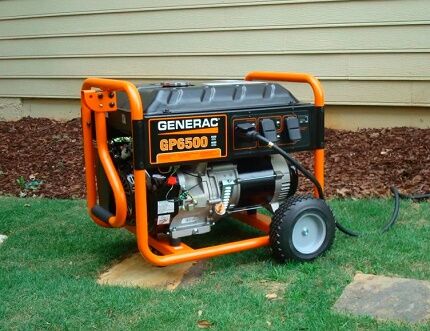
The equipment also differs in the way it is turned on. The unit is started manually.After the power supply is restored, you need to turn off the device yourself. Automatic models spontaneously react to power outages. Shutdown also occurs autonomously.
The device for providing uninterruptible power supply can be frame and inverter. Frame models are most widespread in everyday life. They are distinguished by their large dimensions (from 60 cm) and solid weight (from 40 kg).
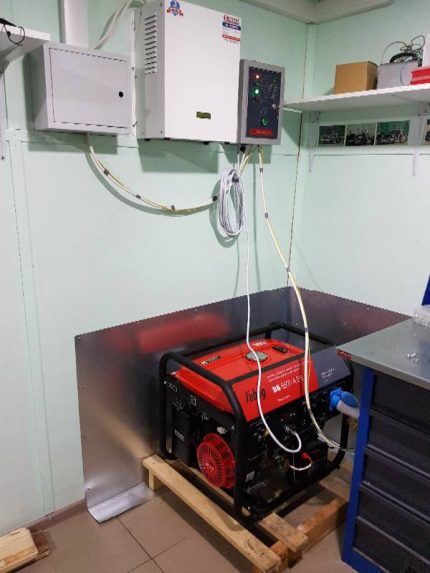
Inverter models are more compact than frame models. They are recommended to be used for power supply of complex electronic devices, the operation of which depends on voltage stability.
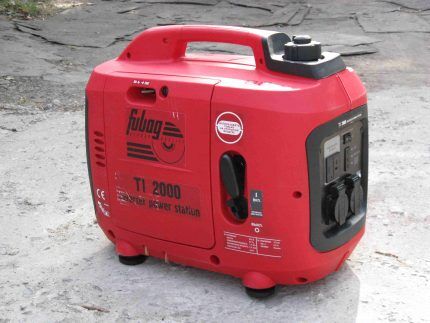
The equipment is divided by phase. The voltage in a single-phase generator is up to 400 Watt. They are used to power several household appliances simultaneously.
Three-phase generators cannot be operated at low temperatures due to the fact that the oil in them instantly solidifies. Under suitable conditions, the equipment can operate for up to 10 hours.
Advantages of a gasoline generator
This device is equipped with two- and four-stroke internal combustion engines, which in turn differ in the location of the valves: upper and lower. The most reliable are four-stroke engines with valves located at the top. The station uses liquid cooling.
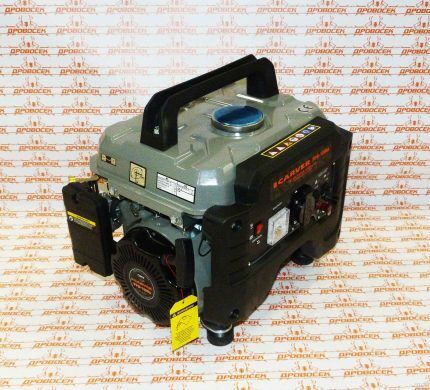
Advantages of a gas generator compared to other models:
- ease of operation at low temperatures (no long warm-up required);
- high-quality gasoline for a generator is easier to find than diesel fuel;
- ease of operation;
- low weight compared to diesel analogues;
- low noise level.
Along with the advantages, the equipment also has disadvantages, including:
- maximum operating time - up to 8 hours;
- high cost of fuel;
- insignificant resource;
- If water gets in, it may malfunction (it is necessary to cover it in bad weather).
During a power outage, do not connect other electrical appliances to the network. Overloading may damage the generator.
Features of connecting the generator
It is important to remember: since the device operates by burning fuel, care must be taken to extract the processed gases. You need to leave at least a meter of free space around the generator in order to have access to the device for refueling, repairs and manual starting.
Before connecting the generator to gas boiler, you should read the instructions. The connection to the network is made in the distribution board, which is equipped with an automatic fuse.
Both networks should not be mixed. For connection, it is recommended to use a copper cable, the cross-section of which depends on the power of the gasoline generator.
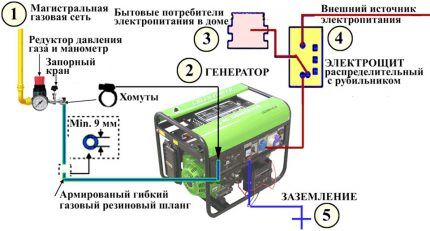
Grounding is done for safety reasons and to create a “zero”, without which the flame recognition system will not function and the boiler will not turn on. If the generator is installed throughout the house, it is grounded through a common network.
In order for the boiler to operate correctly from the generator, the output current sinusoid is 50 hertz. Deviation from this value may cause problems with starting the boiler. A voltage stabilizer will help to cope with this difficulty.
The sequence of connecting a gas generator to a gas boiler:
- find the necessary contacts in the generator set and boiler automation (use the diagram in the instructions);
- connect the wires and insulate them;
- ground the devices.
Despite the simplicity of the steps, it is better to entrust the connection to specialists.
What to do if the boiler does not work from the generator
If after connecting the gas generator to gas boiler the equipment does not start, you should perform several actions:
- turn the fork;
- make sure there is a “zero”;
- check the voltage level;
- Find out which device is the problem by connecting the generator to other equipment.
There are several main reasons why the boiler may not start.
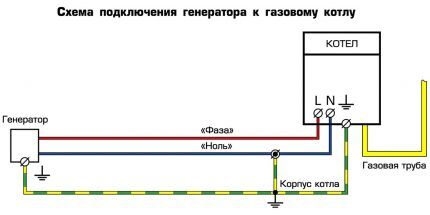
Possible problems and troubleshooting:
- For normal operation of the boiler, the mains voltage must be 190-250 W. To equalize the voltage, it is recommended to install stabilizer. The generators already have an automatic voltage regulator installed. If an external stabilizer is connected immediately after the generator, then both systems may conflict.Solution: do not connect the stabilizer immediately after the generator.
- For flame sensors to work, you need to connect the “zero” to ground. If the boiler body is connected to the ground exclusively through a 220 V plug, then during installation of the resonant filter it is necessary to ground it with a separate wire.
- Due to automatic regulation of the output voltage, gas generators do not produce sinusoidal voltage. As a result, the automatic gas boiler blocks the operation of the generator.
To restore the sinusoidal voltage, a 50Hz resonant filter is used. In addition, it is also possible to use uninterruptible power supplies (UPS). But sometimes the uninterruptible power supply does not detect the generator.
In this case, it is recommended to use a resonant filter or purchase another uninterruptible power supply. The frequency in the power supply must be exactly 50Hz. A resonant filter and a digital tester will allow you to adjust the frequency.
Summarize. Reasons why the boiler does not work and how to correct the situation.
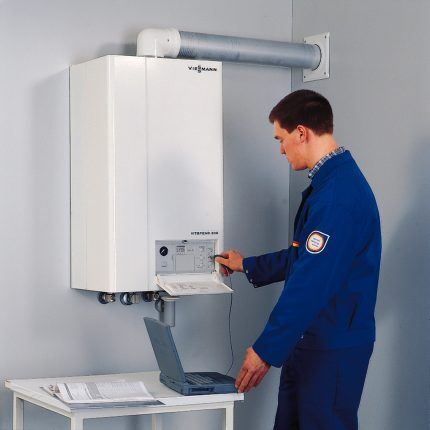
First, malfunction of the flame sensor. The solution is to ground the generator output.
Second, there is no sinusoidal voltage at the output (sign: unstable operation and strong humming). The solution is to install a resonant filter or UPS.
Third — frequency is not 50Hz. The solution is to adjust using a resonant filter.
What problems may occur after connecting?
After the boiler is successfully connected to the generator, incorrect operation of the equipment may occur. The reason lies in the fact that most boilers are phase-dependent.Problems may arise in the electronic control unit of the gas boiler. In this case, the voltage deviates from the norm.
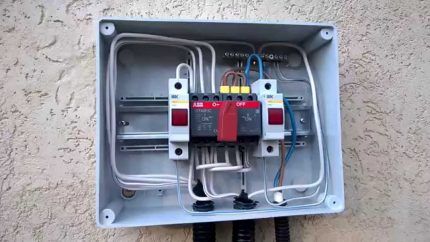
For them to function, the network must have a phase and a neutral. Both wires of the gas generator are phase. If the device is synchronous, then one of the outputs must be grounded.
How to choose a gas generator?
Before choosing a generator for a gas heating boiler, you need to understand for what period you need to reserve electricity.
Situations in which uninterrupted power supply to a gas boiler may be required:
- Regular short-term (up to 2 hours) power outages. They may be associated with a worn-out network or exceeding the consumption limit.
- During the elimination of minor accidents, carrying out planned work, connecting new consumers. Power may be out for up to six hours.
- Emergency shutdown after short circuits or breakdowns in the package transformer substation. The problem resolution period is up to 24 hours.
- Outages due to severe weather conditions. A quick response from repair teams is impossible. Duration: up to three days.
The next step is choosing a specific model.
The main criteria for choosing a gas generator are:
- price;
- power;
- noise level;
- maximum duration of work;
- output current quality.
To determine which generator is needed for a modern gas boiler, each point should be analyzed in detail.
Power - to select this parameter, you need to know the power of the gas boiler.If you plan to connect other devices, their total power is taken into account. 20-30% should be added to the resulting value.
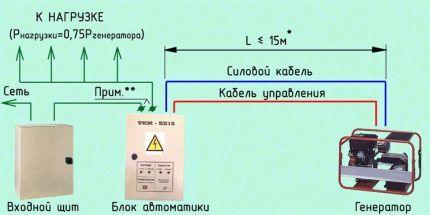
When determining the dimensions, you need to estimate the area of the room. The more compact the model, the higher its cost. Imported gas boilers are demanding on the quality of the supplied current.
In this case, you need a device capable of generating a stable voltage of the required parameters. The noise level of most generators during operation is up to 80 decibels. For inverter models this figure is lower.
Recommendations: do not choose cheap generators. This is a dubious saving, since low-quality equipment is guaranteed to lead to a gas boiler quickly failing.
When choosing a generator, all factors should be taken into account. The more often and for a longer period of time a power outage occurs, the more work the generator has to do.
Conclusions and useful video on the topic
Connecting the generator to a gas boiler:
Possible problems with the generator and stabilizer and ways to solve them:
To keep your home warm during the cold season during a power outage, it is recommended to purchase a gasoline generator. When choosing a model, you need to take into account technical characteristics and economic factors.
If you have experience connecting a gas generator to a gas boiler or have additional information, leave your feedback in the comments. If you have any questions after reading the article, you can ask them to the experts.
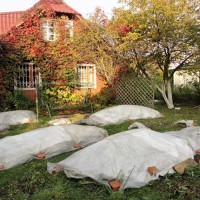


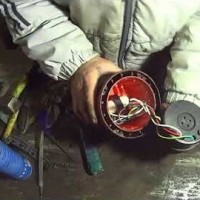
Very interesting article.I’m also thinking about connecting an electric generator to my boiler. Only he will also work extra for my whole house when needed. But I’m still not really sure what power to use for the generator. I decided to consult a professional on this issue... Or can I somehow calculate everything correctly myself?
Well, site visitors know how to ask a question in such a way that they still need to clarify a lot of things with the author themselves before giving an answer. Firstly, what kind of boiler do you have at home, what power? On what basis do you recommend a generator? What budget do you have? Where will the generator be located in winter? For example, a three-phase generator cannot be operated in cold weather, since the oil in it freezes.
In terms of ease of connection, I recommend looking towards inverter gas generators for the following reasons:
— compactness;
— ease of connection;
- stable voltage.
If you specify the budget and model of the gas boiler, as well as the place where the generator will be located in the winter, then I will tell you a specific model of equipment. Also pay attention to the indicator of continuous operation of the generator. In any case, a more or less suitable model will cost at least $300.
Is there no oil in single-phase generators or does it not solidify?